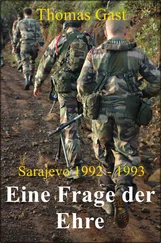At the beginning of the Second World War, Rasim went to the Ustasha headquarters, which you can just see down there by the Miljacka river, before you get to Skenderija with those two white poplars, and signed up the Ustashas. Immediately promoted out of the ranks, he made a habit of walking around town with red eyes. Everybody was afraid of him, even though there was no evidence to suggest that he’d ever harmed anyone. But one of the first things the Partisans did when they entered the city was lock up Rasim in the bank cellar — over there! The leaders wanted to shoot him, but Salamon Finci, a merchant from Bjelave, suddenly appeared from nowhere and spent three days persuading some commissars that Rasim of the Ustasha had saved five Jewish families by sending them to Mostar and then on to the Italians. In the end the commissars believed old Finci and decided to sentence Rasim to three months, for the sake of appearances. He served his time — down there by the forest above Skenderija — and when he got out it was as if nothing had changed. By day he still mourned the death of his wife — and salted bread at night. One morning he was found dead with his head in the dough mixer. Apparently poor Rasim had been lying there for much of the night, with the result that his face had left a mould in the dough. His friends brought him back to his father’s house in Kovači and buried him just here beneath the patch of grass that you are standing on. In a way you can review his whole life, and pass judgement, merely by standing on this spot. Only thieves and children and people with something to hide are buried in valleys. There’s no trace of life in the valley — you can’t see anything from down there.
When I was digging a grave for Salem Bičakčija, who was killed in the road by a sniper, an American journalist came to interview me. Perhaps he’d heard that I lived in California for a while, and had seen the world, spoke languages and knew important people. But now I was working as a gravedigger again, so perhaps he thought that I might be able to explain to him what had happened to the people of Sarajevo.
So I’m digging away, and he’s asking me lots of questions. He wants to know everything, he says.
“About the living or the dead?” I ask.
“Both,” he replies.
I point out that you can’t talk about the living and the dead at the same time, because the dead have their lives behind them while the living don’t know what’s just around the corner, and in what way it could spoil or ruin their lives. In other words, it’s much harder for the living, or so I tell the American, because they have no idea where their grave will be — in the valley or on the slope — or if anybody will remember whether they walked happily or unhappily through the dunjaluk.
The American asks me to explain what I mean by the dunjaluk. I give him a wry look, because I really don’t know the English word for it. In the end I laugh and say, “It means something like ‘all over the world.’” For some people, of course, “all over the world” is just the distance between Marijindvor and Baščaršija, and for others it’s five continents and seven seas. You end up happy or you don’t — and that’s all.
The American nods his head. I can tell that he doesn’t understand or even care what I’m saying, but I don’t take offense. Why should I? I like to have a chat while I’m digging; it helps to pass the time.
He asks me if I’m sorry that I ended up in Sarajevo under siege after having been around the world three times. I tell him that I didn’t end up here. I was born here — and God forbid that I’d ended up dead and buried anywhere else. Who on earth would remember me, or speak about me in respectful tones? Besides which, the graveyards in the rest of the world, and especially in America, are not like the ones in Sarajevo. Elsewhere they line the dead up in rows like soldiers in uniform, with identical headstones, as if their souls had been cast from a mould.
The American continues to nod his head. I say that he shouldn’t hold it against me if I utter disparaging remarks about his country. But then the idiot asks me if I’m ready to die now in Sarajevo. I tell him that I’ve thought up hundreds of ways to stay alive, and I like all of them. Each one reminds me of the joys and pleasures of my life, because nobody’s happier than me when I escape a shell on my way here to dig graves in this beautiful spot for the unlucky ones. I know that the dead used to celebrate being alive too, and that they just happened to lose a life the way some people lose a pinball at the end of the game, having scored a hundred points a hundred times — you could have scored more, but. . you didn’t. Life is only valuable because you know you have it. Death always finds you unprepared, without tangible proof that you ever lived. Perhaps you weren’t much good to yourself or to others. Isn’t that why your wife and children cry at your funeral? Because they have a sense that you foolishly squandered your life, like a chicken that refuses to die even after you’ve chopped off its head.
The American asks me to describe the change in people’s faces. I tell him that I can’t, but I have noticed that somehow they look more beautiful and festive. So then he asks why people are killing one another if they’re so damn festive. I understand that he is researching the subject for his article, except he can’t write the piece because he already knows what it’s going to say. I tell him that he shouldn’t gaze into people’s faces so intently if he doesn’t understand what he sees. Perhaps he should just look at things the way I used to look at neon signs in America, in order to get a rough idea of the country.
I take a packet of cigarettes out of my pocket. “See this?” I begin. “D’you know why the packet is completely blank?” He shakes his head. “It’s because there isn’t anywhere in Bosnia to print the brand names and logos. I bet you think we’re poor and unhappy because we don’t even have any writing on our cigarettes. That’s what you think, isn’t it? Know why? Because you haven’t a clue where to look.”
I begin to unwrap the packet because I know that something is printed on the inside: it might be the label from a box of soap or a detail from a movie poster or part of an advertisement for shoes. I’m very curious to find out what’s inside — I make a point of checking — and it’s always a surprise. The American is curious too, but he has no idea what I’m doing. At last I undo the cigarette packet to reveal a Marlboro wrapper — the old brand from Sarajevo. *The American is nonplussed but I swear under my breath. I don’t know what else to say. Whatever I say, he’ll just think, “Look at these mad people! They turn cigarette wrappers inside out, then tear them apart to see what cigarettes they’ve bought. If you want my opinion, the people here are just like their packs of cigarettes: everything is back to front — what they say and what they think and what they do.”
Later on, I regretted that I ever opened my big mouth to the American. Why didn’t I just say that we are an unhappy and unarmed people who are being killed by Chetnik beasts, and that we’ve all gone crazy with bereavement and grief? He could have written that down, and I wouldn’t have ended up looking ridiculous in his eyes or in my own.
In the United States people use elevators in graveyards. It says a lot about Americans. If the Serbs attacked Pittsburgh or some other city, the local people could just go and hide underground using the elevator. They wouldn’t have to worry about the shelling or the fighting in the streets. When you look at the advertising billboards, fifty feet high, you don’t have a clue what Sarajevo Marlboro is or isn’t. Nor do you comprehend the sort of unhappiness that sent Rasim underground, or why he saved those Jews, or why he was in turn saved by Salamon Finci, or what happened to his face in the dough mixer at Edhem’s bakery, Vrbanja Street, which can be seen from any graveyard.
Читать дальше










